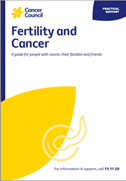- Home
- About Cancer
- Managing side effects
- Fertility and cancer
- Treatment side effects and fertility
- Hormone therapy
Hormone therapy
Hormones that are naturally produced in the body can cause some cancers to grow. The aim of hormone therapy (also called endocrine therapy or androgen deprivation therapy, ADT) is to slow down the growth of these cancers by lowering the amount of hormones the tumour cells are exposed to.
Hormone therapy for breast cancer – If a cancer is growing in response to the hormones oestrogen or progesterone, the cancer cells will have hormone receptors. These are proteins found on the surface of the cancer cell. There are two main types of hormone receptors: oestrogen receptors and progesterone receptors. Cancer cells with hormone receptors on them are said to be hormone receptor positive or hormone- sensitive cancers. They are likely to respond to hormone therapy.
Anti-oestrogen drugs (such as tamoxifen) are used to reduce the risk of oestrogen-sensitive breast cancers coming back after treatment. Many anti-oestrogen drugs are taken for 5–10 years. Pregnancy should be avoided while taking the drugs and for 9 months afterwards, as there is a risk the drugs could harm an unborn child. These drugs can cause menopause symptoms, although they don’t bring on menopause. Anti-oestrogen drugs do not damage the ovaries or eggs. Males with breast cancer who are taking the drug tamoxifen may experience increased sperm production.
Hormone therapy for cancer of the uterus – Some cancers of the uterus grow in response to oestrogen. Hormone therapy may be given if the cancer has spread or if the cancer has come back, particularly if it is a low-grade cancer.
Hormone therapy for prostate cancer – The hormone testosterone helps prostate cancer to grow. Hormone therapy may reduce how much testosterone your body makes and help slow the growth of the cancer or even shrink the cancer, but it may also cause infertility.
Although hormone treatments for breast cancer are used for many years, ask your doctor if it is possible to take a break from the drugs to try for a baby.
→ READ MORE: The impact of other cancer treatment on fertility
Podcast: Coping with a Cancer Diagnosis
Listen to more of our podcast for people affected by cancer
More resources
Prof Martha Hickey, Professor of Obstetrics and Gynaecology, The University of Melbourne and Director, Gynaecology Research Centre, The Royal Women’s Hospital, VIC; Dr Sally Baron-Hay, Medical Oncologist, Royal North Shore Hospital and Northern Cancer Institute, NSW; Anita Cox, Cancer Nurse Specialist and Youth Cancer Clinical Nurse Consultant, Gold Coast University Hospital, QLD; Kate Cox, McGrath Breast Health Nurse Consultant, Gawler/ Barossa Region, SA; Jade Harkin, Consumer; A/Prof Yasmin Jayasinghe, Director Oncofertility Program, The Royal Children’s Hospital, Chair, Australian New Zealand Consortium in Paediatric and Adolescent Oncofertility, Senior Research Fellow, The Royal Women’s Hospital and The University Of Melbourne, VIC; Melissa Jones, Nurse Consultant, Youth Cancer Service SA/NT, Royal Adelaide Hospital, SA; Dr Shanna Logan, Clinical Psychologist, The Hummingbird Centre, Newcastle West, NSW; Stephen Page, Family Law Accredited Specialist and Director, Page Provan, QLD; Dr Michelle Peate, Program Leader, Psychosocial Health and Wellbeing Research (emPoWeR) Unit, Department of Obstetrics and Gynaecology, The Royal Women’s Hospital and The University of Melbourne, VIC; Pampa Ray, Consumer; Prof Jane Ussher, Chair, Women’s Health Psychology, and Chief Investigator, Out with Cancer study, Western Sydney University, NSW; Prof Beverley Vollenhoven AM, Carl Wood Chair, Department of Obstetrics and Gynaecology, Monash University and Director, Gynaecology and Research, Women’s and Newborn, Monash Health and Monash IVF, VIC; Lesley Woods, 13 11 20 Consultant, Cancer Council WA.
View the Cancer Council NSW editorial policy.
View all publications or call 13 11 20 for free printed copies.
Need to talk?
Support services
Coping with cancer?
Speak to a health professional or to someone who has been there, or find a support group or forum
Looking for transport, accommodation or home help?
Practical advice and support during and after treatment
Cancer information
Sexuality, intimacy and cancer
Learn more about the impacts of cancer on sexuality and intimacy
Managing side effects
Learn about the different side effects cancer and its treatment can cause, and how to manage them

